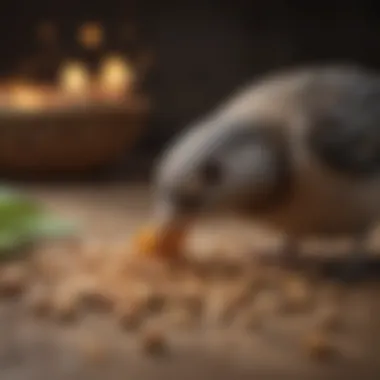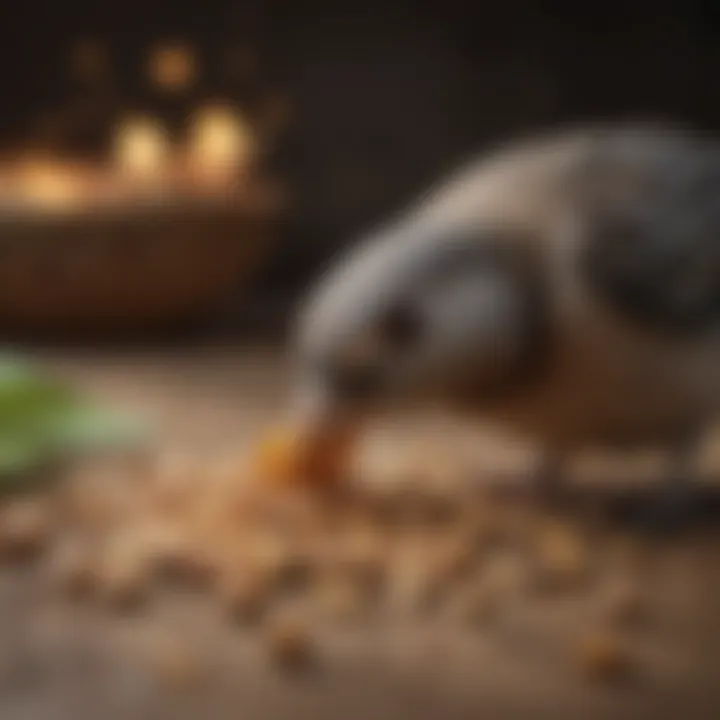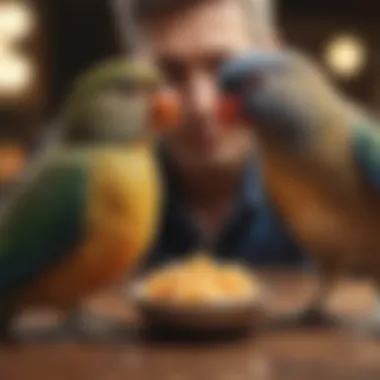Coconut Oil: A Guide for Pet Bird Nutrition


Intro
When it comes to the wellness of pet birds, every little detail in their care matters. Among the barrage of dietary options, coconut oil occasionally surfaces as a hot topic. But is it suitable for our feathered friends? This piece aims to shed light on that question and more. We’ll dive into the potential advantages and pitfalls of including coconut oil in your bird's nutrition, evaluating the impact on their specific dietary needs and overall health.
The inclusion of coconut oil isn’t just a matter of culinary delight. It touches on broader themes of nutrition and well-being. Each bird species comes with its own quirks, and understanding these can set the groundwork for proper feeding practices. With that said, let’s start by exploring essential care tips to foster a healthy environment for your avian companions.
Foreword to Coconut Oil and Birds
When it comes to enhancing the diets of our feathered companions, the inclusion of coconut oil is both a trend and a topic of growing interest. The question arises: can this tropical oil benefit pet birds? The exploration of this subject not only opens doors to understanding dietary choices for birds but also highlights the unique nutritional needs of various species. As owners, we are responsible for providing a balanced diet that aligns with the natural habits of birds, and coconut oil may play a significant role in this quest.
Understanding Coconut Oil's Nutritional Profile
Coconut oil comprises mostly medium-chain fatty acids, which are easily digestible and can provide a rapid source of energy. It contains lauric acid, known for its potential health benefits, including antimicrobial properties. Many pet owners emphasize the importance of healthy fats in a bird’s diet, as these fats can support various bodily functions, from energy production to feather health. The high-fat content of coconut oil, however, necessitates careful consideration.
When incorporating coconut oil, it’s crucial to evaluate the overall dietary balance. Birds require a variety of nutrients, and while coconut oil can offer substantial energy, it should complement a diverse diet rich in fruits, vegetables, and seeds. Moreover, nutritionists advise against using coconut oil solely as a fat source, as an over-reliance can lead to imbalance.
Historical Use of Coconut Oil in Animal Care
Coconut oil is not just a modern dietary fad but has been historically utilized in animal care, particularly in tropical regions. In fact, the use of coconut oil dates back centuries, where it was commonly applied to support skin health in various animals, including livestock. The benefits were recognized far and wide, with many traditional practices still influencing how we think about animal nutrition today.
Interestingly, the approach to using coconut oil tends to vary across cultures and species. In many cultures, coconut oil has been used both as a dietary supplement and for topical applications, like moisturizing feathers and skin. This historical context paints coconut oil not just as a nutritional supplement but as a potential all-purpose remedy for pet bird care. However, pet owners must keep in mind that while there is anecdotal evidence supporting these practices, scientific backing specifically for birds remains less concrete.
Can Pet Birds Have Coconut Oil?
When it comes to the question of whether pet birds can safely consume coconut oil, it's a discussion that brings together several important factors. Bird owners are often keen to find ways to enhance their pet's diets, aiming for optimal nutrition. Coconut oil has gained popularity for its potential health benefits; however, introducing it into a bird's diet isn't as straightforward as it might seem.
Coconut oil is rich in medium-chain triglycerides, which are known to provide a quick source of energy. Birds, like other pets, require fats for energy, but the types of fats are crucial. Understanding how coconut oil interacts with different species is essential, as well as being aware of the general safety measures that should be taken when incorporating new ingredients into their diet.
Species-Specific Considerations
Not all birds are created equal, and their dietary needs can vary significantly based on species. For instance, parrots are often less sensitive to fat intake compared to finches or canaries. Thus, when considering coconut oil as an addition to their diet, it’s necessary to recognize these nuances.
- Parrots: Generally, they can tolerate small amounts of coconut oil. It may even improve their feather condition and overall energy levels.
- Finches & Canaries: These smaller birds tend to have more delicate systems and can be more susceptible to high-fat diets. Offering even a small amount of coconut oil may not be advisable.
- Budgerigars: Similar to finches, budgies can be picky eaters and too much coconut oil could disrupt their digestion.
This species-specific approach should be a guiding principle when contemplating whether to incorporate coconut oil.
General Safety Guidelines
When introducing any new food into your bird's diet, certain general safety guidelines are paramount. Here are some tips to ensure a smooth transition:
- Start Slow: Always begin with a small dose to observe how your bird reacts. A teaspoon mixed in their regular food can be a reasonable starting point.
- Observe Reactions: Pay attention to any changes in behavior, droppings, or signs of digestive upset. If anything seems off, consult with an avian vet immediately.
- Balanced Diet: Remember that coconut oil should not replace a balanced diet. It’s vital to maintain a diverse range of foods including seeds, grains, fruits, and vegetables.
- Consult with a Vet: Before altering your bird's diet, particularly with fats, it's wise to chat with a vet knowledgeable about avian nutrition.
It's not just about whether coconut oil is safe—it’s about how it fits into the overall picture of your bird's dietary needs. A nuanced understanding of what different species require helps in making informed decisions that cater to their health and wellbeing.
"Bird nutrition is not a one-size-fits-all approach; each species has unique needs that must be respected."
By paying close attention to these considerations and guidelines, bird owners can better navigate the introduction of coconut oil into their pets’ diets.
Nutritional Benefits of Coconut Oil for Birds


When navigating the world of pet bird nutrition, coconut oil emerges as a topic worth pondering. Its unique composition of medium-chain fatty acids, particularly lauric acid, sets it apart from other fats. Not only does it provide essential energy, but it also harbors potential benefits that can support the overall health of our feathered companions. Understanding the nutritional advantages of coconut oil is crucial for bird owners who wish to enhance their pets' diets in a safe and beneficial manner.
Healthy Fats and Energy Source
High-quality fats are essential in any bird's diet, serving as a primary energy source. Coconut oil, rich in healthy saturated fats, delivers quick energy, which is especially vital for active bird breeds. When birds consume coconut oil, the medium-chain triglycerides (MCTs) found within are metabolized differently than other types of fats. Instead of being stored as body fat, MCTs can be converted more readily into energy. This is particularly advantageous for birds that are constantly on the go, whether they're flitting about their cage or engaging in playful antics.
Unsurprisingly, incorporating coconut oil into their diet can invigorate their daily activities. However, moderation is key. A bird's diet should still primarily consist of a balanced mixture of seeds, nuts, and vegetables, with coconut oil being a complement rather than a staple.
Potential Antimicrobial Properties
Distinct among fats, coconut oil possesses reputed antimicrobial characteristics. Lauric acid, a principal fatty acid in coconut oil, may aid in combating certain pathogens that could threaten the health of pet birds. This is relevant when considering common ailments affecting birds, including yeast infections and bacterial growth. The potential to bolster the immune system through proper dietary components is always a bonus in pet care.
However, it's essential to approach this with a grain of caution. While these properties might exist, one should not rely solely on coconut oil as a treatment or preventive measure against infections. Always consult a veterinarian for professional guidance regarding health concerns.
Skin and Feather Health
Healthy feathers and skin are not just a mark of a happy bird; they're fundamental to their overall well-being. Incorporating coconut oil into a bird's diet can support skin and feather vitality. The fatty acids in coconut oil help maintain proper feather structure, contributing to a reduction in feather plucking and enhancing their natural shine. Additionally, when applied externally, coconut oil can serve as a moisturizer for dry skin, alleviating discomfort associated with flaky or irritated skin. Pet owners often note improvements in their birds' appearance and behavior after consistent use of coconut oil.
"A bird's feathers are its pride, and coconut oil can help keep them healthy and vibrant."
Yet, while the topical application shows promise, remember that ingesting coconut oil can also contribute to skin health from within. Finding a balance that works for each bird's unique needs is crucial.
In summary, the nutritional benefits of coconut oil for birds cannot be understated. From being an energy powerhouse to contributing to feather luster and offering a potential line of defense against pathogens, its inclusion could indeed bring noteworthy advantages. However, as with any dietary change, it’s advisable to introduce it thoughtfully and with attention to your bird’s specific needs.
Potential Risks Associated with Coconut Oil
When considering the integration of coconut oil into a pet bird’s diet, it’s crucial to evaluate not just the potential benefits but also the risks involved. While coconut oil is often hailed for its health benefits, there are specific elements that can raise concerns among avian enthusiasts. Understanding these risks can help pet bird owners make informed decisions about what to feed their feathered friends.
Caloric Content and Obesity Concerns
Birds have a unique metabolism and dietary requirements compared to other pets. This makes caloric intake a pivotal aspect of their health. Coconut oil, while highly nutritious, is calorically dense. Just one tablespoon of this oil contains about 120 calories, which can pack quite a punch for a small bird.
If a bird’s diet starts to include too much coconut oil without reducing other high-calorie foods, there exists the risk of obesity. Obesity can lead to a slew of health issues, such as heart disease and diabetes.
- Watch the Quantity: It’s essential to consider how much coconut oil you are adding to your bird's meals.
- Balance is Key: If coconut oil becomes a staple, this may necessitate a reduction in other caloric sources in the diet.
Owners should always be mindful of their bird's behavior and physical condition when introducing new foods.
Allergic Reactions in Birds
Though uncommon, allergic reactions can happen in birds just as they can in humans. Birds have been known to react negatively to certain foods, and coconut oil is not entirely immune to this possibility. Signs of an allergy can manifest in various ways, including:
- Changes in feather quality or texture
- Skin irritations or excessive preening
- Gastrointestinal upset
If any of these symptoms arise after introducing coconut oil, it’s prudent to halt its use and consult with a veterinarian for further evaluation. Noticing these symptoms early can help prevent more significant complications down the road.
Interactions with Other Dietary Components
The introduction of coconut oil into a bird's diet should also consider how it interacts with other dietary elements. For instance, rich fatty foods can interfere with the absorption of certain vitamins and minerals. Coconut oil is high in saturated fats, which when consumed in excess, can lead to imbalances in nutrient intake.
Additionally, if a bird already consumes a diet that is rich in other oils or fats, adding coconut oil without adjusting for these components can lead to an overload. Monitoring overall dietary fats and ensuring a balanced mix of nutrients is advisable.
Important Consideration: Always approach dietary changes with caution. Introducing coconut oil slowly and in moderation can help assess how individual birds respond without overwhelming their systems.
How to Safely Introduce Coconut Oil to Your Bird's Diet


The topic of safely introducing coconut oil into a pet bird's diet is crucial for understanding how it can both benefit and potentially harm these feathered companions. While coconut oil offers several nutritional advantages, it’s essential to approach its inclusion with caution and care. Birds, just like humans, react differently based on their species, health status, and existing dietary habits. Thus, it’s not just a matter of adding a spoonful of coconut oil to their food; it's about integrating it thoughtfully.
For pet bird owners, this section serves as a navigational guide through the dos and don'ts of incorporating coconut oil into their birds' meals. Proper knowledge of dosage, methods of administration, and the importance of monitoring the bird's reactions can lead to more informed decisions that prioritize the bird's health and well-being.
Recommended Dosage and Serving Sizes
Finding the right dosage of coconut oil for pet birds is where things can get a bit intricate. Generally, a small amount can go a long way. For example, starting with about 0.1 to 0.2 teaspoons, depending on the bird’s size, is typically enough. A tiny budgie may only need a few drops, while a larger parrot could handle up to half a teaspoon. It's essential not to overwhelm your bird with too much oil at once, as that could lead to digestive troubles or unwanted weight gain.
- Points to consider for dosage:
- Begin with small amounts to gauge tolerance.
- Adjust based on your bird’s health, age, and activity.
- Be cautious with higher doses, especially for birds prone to obesity.
Methods of Administration
Administering coconut oil can be done in various ways, and the method may greatly depend on your bird's habits and preferences. Here are several useful approaches:
- Direct Feeding: Mix the oil into a favorite treat or mash, making it enticing. Birds often enjoy a mash of fruits or leafy greens where a drop or two of oil can be integrated:
- Cooking Preparation: It’s possible to add coconut oil during the cooking of some bird-safe recipes, giving the food an appealing flavor. Just remember to let the food cool before serving.
- As a Skin and Feather Conditioner: Some owners apply a tiny amount externally, rubbing it gently onto the skin or feathers. This practice can hydrate and nourish the plumage but should be done in moderation to avoid any greasy residue.
- Example: Blend coconut oil into a fruit puree such as banana or apple.
Monitoring Your Bird's Reaction
Once you’ve introduced coconut oil to your pet bird’s diet, keeping a close watch on their reactions is vital. Signs to monitor include:
- Changes in appetite: Has your bird taken a liking to the new oil? Or are they refusing food?
- Digestive issues: Check for any unusual stool color or consistency shortly after introducing the oil. Diarrhea or vomiting could indicate an intolerance.
- Behavioral changes: Increased lethargy or unusual flapping might hint at discomfort.
It may take some time for your bird to adjust, and patience is key. Taking these proactive steps ensures that the addition of coconut oil is a healthy enhancement rather than a stumbling block in their dietary regimen.
Always consult a veterinarian before making significant changes to your bird's diet to tailor the approach based on individual health needs.
Alternatives to Coconut Oil for Avian Nutrition
When we talk about the diet of pet birds, it’s crucial to explore not just the benefits of one item—like coconut oil—but also the other options available. Alternatives to coconut oil can offer a wealth of nutrients and support healthy growth, energy levels, and overall well-being. Each bird species may have its unique needs, and diversifying their diet can prevent them from becoming picky eaters while ensuring they’re getting a balanced intake of essential vitamins and fats.
Exploring alternatives is key, as relying solely on coconut oil could lead to imbalanced nutrition. Taking a closer look at other natural oils, healthy fruits and vegetables, and commercial foods helps complete a bird's dietary puzzle.
Other Natural Oils Beneficial for Birds
While coconut oil may be touted as a superfood for your feathered friend, other natural oils can also contribute positively to avian nutrition. For instance, flaxseed oil is known for its omega-3 fatty acids, which support heart health and feather quality. Likewise, hemp seed oil is rich in healthy fats and provides an excellent source of protein. Here are a few noteworthy oils:
- Flaxseed Oil: Rich in omega-3s, great for overall health and enhancing plumage.
- Hemp Seed Oil: Contains a good balance of omega-3 and omega-6 fatty acids, ideal for skin health.
- Olive Oil: A heart-healthy fat that can be used occasionally for flavor and health benefits.
You might consider rotating these oils into your bird’s diet. A little goes a long way, making it easy to incorporate without overwhelming their taste buds.
Fruits and Vegetables Rich in Healthy Fats
Another avenue to explore is fruits and vegetables that are packed with healthy fats. These can provide not only the necessary fats but also a host of vitamins and antioxidants that support a bird's health on multiple fronts. For example:
- Avocados: Yes, they are often discussed with caution around birds, but small, controlled amounts of ripe avocado can add beneficial fats. Always make sure to consult your vet.
- Olives: Another fruit that’s loaded with healthy fats. Plain, unsalted olives can be a delightful treat for your pet bird.
- Pumpkin Seeds: Not just for fall decorations, these seeds are rich in zinc, which is essential for the immune system and overall growth.


Mixing these into your bird's daily snack can not only vary their diet but also sneak in some necessary nutrients that are essential for their vitality.
Commercial Bird Foods with Balanced Nutrition
If navigating through oils and produce sounds a bit tricky, commercial bird foods are often crafted with avian nutrition in mind. Many brands focus on delivering a complete balance of seeds, pellets, and enrichment sources that cater specifically to birds. Look out for:
- Pelleted Diets: These provide a comprehensive source of nutrition as they often contain essential vitamins, minerals, and proteins.
- Seed Mixes: Opt for blends that include a variety of seeds rather than just one type. This ensures your bird is not missing out on necessary nutrients.
- Fortified Treats: Some products come enhanced with vitamins and nutrients.
Choosing quality brands is paramount. Look for ones with natural ingredients, avoiding those packed with fillers or artificial preservatives that can compromise your bird's health. A quick glance at ingredient lists can give you the security and assurance you’re seeking for your pet.
"The variety in a pet bird's diet not only keeps them physically healthy, but also mentally stimulated."
Expert Opinions on Coconut Oil and Birds
When it comes to the health of pet birds, the role of specialists like veterinarians and avian nutritionists can't be overstated. Their insights help to clarify the implications of including coconut oil in a bird's diet, comprising both potential benefits and areas of caution. In this section, we will delve into expert opinions that shed light on the appropriateness of coconut oil for our feathered friends.
Veterinary Insights on Avian Nutrition
Veterinarians, often armed with years of training in animal health, bring vital information to the table. From their perspective, the nutritional needs of birds are different from those of mammals. Birds, for instance, rely heavily on a balanced intake of fats, proteins, and carbohydrates, tailored to their species and size.
In many cases, vets recognize coconut oil for its medium-chain triglycerides (MCTs), which provide a potent source of energy. However, they often caution against treating coconut oil as a primary fat source. A vet's insight emphasizes:
"Coconut oil should complement a bird's diet, not dominate it. Balance is key."
Moreover, some veterinarians advise that while coconut oil may aid in maintaining a healthy plumage or support skin health, moderation is essential due to its high caloric content. They emphasize that introducing any new food item, including coconut oil, should be done gradually to monitor any adverse reactions. It’s like adding a splash of seasoning; a little goes a long way.
Avian Nutritionists’ Recommendations
Avian nutritionists take a more granular look at dietary components specific to bird species. Their recommendations on coconut oil further underscore the need for a thoughtful approach. They often highlight that not all birds may respond favorably to coconut oil. For instance, while species such as cockatiels or budgerigars might benefit from its properties, birds with specific health concerns, like obesity or liver issues, might need to avoid it altogether.
Nutritionists also advise pet owners to focus on high-fiber diets that include a variety of seeds, fruits, and vegetables. They recommend coconut oil as a potential topping or condiment rather than a primary ingredient in bird meals. The thinking here is that it can enhance the flavor and palatability of certain dishes without overshadowing other essential nutrients.
To summarize, expert opinions point toward a cautious optimism regarding the use of coconut oil in pet bird diets. The key lies in diligently understanding the specific needs of your bird and ensuring a well-rounded dietary regimen. When employed thoughtfully, coconut oil can supplement the wellness strategy for our avian companions.
The End
Coconut oil has become a buzzing topic in the realm of pet bird nutrition. By thoroughly examining its potential benefits and pitfalls throughout this article, we can distill the essence of what coconut oil may mean for our feathered companions. In the simple yet complex journey of caring for pet birds, understanding the role of coconut oil adds a layer of depth that assists informed decision-making for bird owners.
Summarizing the Impact of Coconut Oil on Bird Health
Coconut oil is rich in medium-chain fatty acids, contributing to energy levels and overall vitality in birds. These fats, particularly lauric acid, can provide the necessary caloric intake that active birds need. Not only does this oil offer potential benefits for feather health and skin condition, but its antimicrobial properties might also support the immune system. It appears that when incorporated mindfully into a bird's diet, coconut oil can enhance their overall well-being.
However, keeping a keen eye on how coconut oil interacts with individual bird species is crucial. Each pet bird has its own set of dietary requirements and sensitivities.
"Coconut oil isn’t a magic cure, but when used properly, it can be a valuable addition to a balanced diet."
Highlighting the need for moderation and attentiveness, the evidence suggests that while coconut oil holds promise, owners must remain vigilant of the quantity being introduced to avoid weight gain or allergic reactions.
Final Thoughts on Optimal Bird Nutrition
In the broader picture of avian nutrition, coconut oil can be esteemed among a variety of dietary inclusions. The key takeaway remains that fostering optimal health in pet birds goes beyond any single ingredient. It requires a balanced diet, built upon diversity and healthy choices.
As bird parents, it’s imperative to research thoroughly, consult with veterinarians, and observe changes in their pets following dietary modifications. The reality for pet birds is that optimal nutrition isn't about just what they eat, but also how it affects them holistically.
In summary, coconut oil can have its place within the intricate tapestry of bird nutrition, albeit with a careful eye toward making informed adjustments to their diet. By staying aware of the unique needs of each bird species and balancing this with thoughtful considerations, we pave the way for happier, healthier feathered friends.















